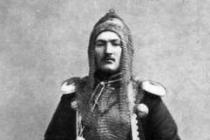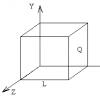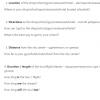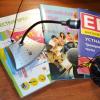Plusquamperfect- this long word denotes the pre-past tense. It is usually quite difficult to understand when learning German. In this article we will talk about the formation of time, basic rules, examples, exceptions and give a couple of simple formulas. Everything will fall into place and you will stop getting confused in coordinating times.
RULE: Plusquamperfekt used to express antepast or long past time.
The antecedent tense expresses an action that happened before/previously some other action. For example: When Katya went to the store, we started watching TV.
That is, Katya first bought something, and only then they began to relax. The past is before the past.
When used in writing and speech, Plusquamperfekt expresses the coordination of tenses. (see Rule 1)
RULE 2: Plusquamperfekt implies the creation compound predicate, that is, a predicate that consists of several words (verb + participle).

When do we use the verb HABEN?
The same rule applies here as in the usual one. Let's repeat it again:The verb haben is combined with:
a) so-called transitive verbs (sehen - look, nehmen - take, lesen - read);b) reflexive verbs (sich versuchen - try, sich benehmen - behave, sich verabschieden - say goodbye, sich bemühen - try);
c) impersonal verbs (regnen - to go (about rain), schneien - to go (about snow), scheinen - to shine);
d) as well as groups intransitive verbs, namely:
1. verbs, not indicating movement, but requiring an addition after themselves in the dative case (antworten - to answer, schenken - to give, sagen - to speak, geben - to give, helfen - to help, vertrauen - to trust)
2. verbs, which do not indicate movement and change of state(arbeiten - work, hängen - hang, liegen - lie, sitzen - sit, stehen - stand, etc.)
3. verbs that clearly indicate initial and final stages of the process (anfangen - to begin, beginnen - to begin, aufhören - to stop);
4. Absolutely everything modal verbs and myself haben.
About word order
For clarity, let’s introduce the values of the part of the compound predicate:
V1 - auxiliary verb (haben or sein)
V2 - Partizip II of the semantic verb
General cases:
1) if in a sentence, then Partizip II of the semantic verb is always at the end of the sentence:
Er hatte das Auto gekauft. - He bought a car. (formula: V1 + V2)
2) depending on the location of the secondary members, the subject can “drop in” behind the auxiliary verb:
Vorgestern hatte er das Auto gekauft. - The day before yesterday he bought a car. (formula: V1 + V2)
3) when the word order in subordinate clauses is changed, both verbs are placed at the end of the sentence, and then the semantic part V2 is used first, and then the auxiliary verb V1:
Nachdem sie seine Oma angerufen hatte, ging sie schlafen. (formula: V2 +V1)
RULE 3: when in a sentence, in addition to the auxiliary verb, there are semantic and modal verbs, then both are put in an indefinite form.
Compare:
Wir hatten es nicht gewollt. - We didn't want this.
Wir hatten es nicht tun wollen. - We didn't want to do this
(according to Rule 3 links tun + wollen put in an indefinite form).
When do we use the verb SEIN?
The verb sein is combined with:
a) verbs, meaning movement or displacement(fahren - to go, zurückkehren - to return, spazierengehen - to go for a walk, kommen - to come, laufen - to run, fallen - to fall);B) verbs meaning state change(aufstehen - get up, aufwachen - wake up, durchfallen - fail, vergehen - pass, sterben - die);
B) verbs werden, bleiben, begegnen, gelingen, geschehen, passieren and the verb itself sein.
Note: depending on the context, verbs of motion such as fahren, fliegen can be used with both haben and sein.
For example:
Ich war mit altem Bus langsam gefahren. - I was driving slowly on an old bus.
Ich hatte den Bus gefahren. - I was driving the bus.
Ich war mit dem Hubschrauber geflogen. - I was flying in a helicopter.
Ich hatte den Hubschrauber geflogen. - I flew a helicopter.
As can be seen from the examples, in the second case it is not so much the movement that is important, but the fact of control itself vehicle.

Long past or pre-past?
Let us now find out how to distinguish long-past tense from pre-past tense.Pluperfect
Let's read the sentence:Ich hatte im Jahr 1992 mein Haus gebaut. - I built my house in 1992
(It is implied that the action occurred a long time ago relative to the realities of the present) 1
The year 992 is already quite deep in the past, which is what the use of Plusquamperfekt signals to us here.
MEMORY: If we want to mention long-past events, and it is important for us to emphasize their prescription, then we can safely use Plusquamperfekt.
Pre-past tense
Let's consider two proposals:Sie sind in den Bus eingestiegen. - You got on the bus
Sie sind mit ihm nach der Bibliothek gefahren. - You drove it to the library
Both sentences use perfect, but what if one event happened before the other?
That is, how to describe what first they get on the bus
, and then get there on it
to the library? This is where Plusquamperfekt comes to the rescue.
Since the first event happened before the other, it is advisable to apply the antecedent tense to it:
Sie waren in den Bus eingestiegen. Sie sind Damit zur Bibliothek gefahren. -You got on the bus. You rode it to the library. (implies that we came in first and then left)
MEMORY: Plusquamperfekt we highlight an action in the past that occurred before another action.
As practice shows, in most cases in speech such sentences are combined into a complex construction using the conjunction
nachdem- after
And then the main clause takes the form of the past tense (Präteritum).
This is a unique case of tense agreement, when one tense - Plusquamperfekt - is compound, containing both an auxiliary verb and a semantic verb, and the other is simple (Präteritum), containing only one semantic verb.
WARNING: The conjunction nachdem changes the word order .
Here are some examples:
Nachdem meine Schwester aufgewacht war, verstand sie eine einfache Sache: der Film war schon zu Ende - After my sister woke up, she realized one simple thing: the film was already over.
Nachdem ich die Räder gepumpt hatte, fuhr mein Fahrrad besser los. - After I pumped up the tires, my bike rode better.
Nachdem sie diese schwere Aufgabe gelöst hatte, fühlte sie sich sehr entkräftet. - After she solved this difficult problem, she felt exhausted.
IN German there is a rare form of double antecedent tense, or Doppeltes Plusquamperfekt or Ultra-PlusquamperfektConstruction formula Doppeltes Plusquamperfect is this:
SUBJECT + HABEN/SEIN IM PRÄTERITUM + PARTIZIP II SENSIBLE VERB + GEHABT/GEWESEN.
This construction contradicts the norms of the literary German language. If Plusquamperfekt I ambiguously expresses the action, then we agreed in such cases to use Doppeltes Plusquamperfect.
Als die Baustoffe geliefert wurden, hatten die Arbeiter den neuen Stock gebaut gehabt. - When the building materials were delivered, the workers built a new floor
Als die Baustoffe geliefert wurden, hatten die Arbeiter den neuen Stock bereits gebaut. - When the construction materials were delivered, the workers had already built a new floor
This tense is often used in dialects and colloquial speech. By the way, Matrin Luther loved him. But if you are learning literary German, then the usual Plusquamperfekt is more than enough. Do you want to learn German? Enroll in Deutsch School Online! To study, you need a computer, smartphone or tablet with Internet access, and you can study online from anywhere in the world at a time convenient for you.
Rustam Reichenau, Deutsch Online
Let's take two simple sentences:
Ich habe die Arbeit beendet. - I finished work.
Ich bin nach Hause gegangen. - I went home.
In both sentences Perfect (perfect tense). All this has already happened, in the past. But the first event (finishing work) happened before the second (going home). Therefore, for the first event you can use the double past tense, the pre-past tense - Plusquamperfect(which in Latin means more than perfect):
Ich hatte die Arbeit beendet. Ich bin nach Hause gegangen.
To do this, as you can see, you just need to put the auxiliary verb in Präteritum (past tense): ich habe -> ich hatte, ich bin -> ich war.
More often Plusquamperfect used in complex sentences with an introductory word nachdem (after):
Nachdem ich die Arbeit beendet hatte, ging ich nach Hause.
= Nach der Arbeit ging ich nach Hause.
Please note that in the main clause it is used Präteritum(but not Perfect). This is the only case of tense agreement in the German language: in sentences with nachdem(and even then it is not at all mandatory). If one time is compound ( Plusquamperfect because it consists of two verbs: semantic and auxiliary), then the second is simple, consisting of one verb ( Präteritum). Like this:
Nachdem ich nach Hause gekommen war, aß ich zu Abend. - After I came home(in Russian it can be said more simply: coming home), I had dinner.
Nachdem ich gegessen hatte, schaute ich noch ein wenig fern. – After I ate, I watched TV a little more.
Nachdem mein Wagen gestohlen worden war, rief ich die Polizei. “After my car was stolen, I called the police.
In the latter case you see Plusquamperfect Passiv. It remains to add that in addition to proposals with nachdem(and then only if they are talking about the past) the pre-past tense is rarely used, and in colloquial speech it is almost not used at all.
Try it yourself:
Make up sentences with nachdem in the past time:
einen Freund treffen – zusammen ins Cafe gehen (meet a friend – go to a cafe together), im Cafe essen – ein schönes Mädchen sehen – es/sie kennen lernen (wollen) (eat in a cafe – see a beautiful girl – get to know her (want) , es/sie ansprechen – (sie) lächeln (talk to her – smile), (wir) sich sicherer fühlen – (wir) sich vorstellen – an ihrem Tisch bleiben (-blieb – geblieben, s) – viel sprechen (-sprach – gesprochen) und trinken (-trank – getrunken) – zusammen singen (-sang – gesungen) – ganz glücklich werden (-wurde – geworden, s) – sich streiten (-stritt – gestritten) – sich schlagen (-schlug – geschlagen) – von der Polizei festgenommen werden - ganz traurig werden (feel more confident - introduce yourself - stay at her table - talk and drink a lot - sing together - become completely happy - quarrel (argue) - fight - be detained by the police - become completely sad).
Past tense (Präteritum)
Except Perfect (perfect tense) There is also a simple past tense in the German language - Präteritum(which in Latin means past past). It is formed using the suffix -t-. Compare:
Ich tanze. – I am dancing (present tense – Präsens).
Ich tanz t e. – I danced (past tense – Präteritum).
This is similar to the English past tense, where the sign of the past tense is the suffix -d-:
I dance – I danced.
Präsens Präteritum
ich sage - I say ich sagte - I said
wir, sie, Sie sagen wir, sie, Sie sagten
du sagst du sagtest
er sagt er sagte (!)
ihr sagt ihr sagtet
Feature Präteritum is what is in the form he she it) no personal ending added -t, that is: forms I And He match up. (As you remember, the same thing happens with modal verbs.)
As we have already said, the German language has strong (irregular, non-rule) verbs. Sagen – weak, regular verb. And here fallen – strong:
ich, er fiel (I, he fell), wir, sie, Sie fielen,
du fielst,
ihr fielt.
The past tense suffix is no longer needed here -t-, since the past tense is indicated by the changed word itself (compare with English: I see - I see, I saw - I saw). Forms I And He are the same, there are no personal endings in these forms (all the same as with modal verbs in the present tense).
So, the Russian phrase I bought beer It can be translated into German in two ways:
Ich kaufte Bier. – Präteritum (past tense).
Ich habe Bier gekauft. – Perfect (perfect tense).
What is the difference?
Perfect is used when an action performed in the past is connected with the present moment, when it is relevant. For example, you come home and your wife asks you (as they say, dreaming is not harmful):
Hast du Bier gekauft? – Did you buy beer?
Ja, ich habe Bier gekauft.(You answer with a sense of accomplishment).
She is not interested in the moment in the past when you bought beer, not in history, but in the result of the action - that is, the availability of beer. Is it done or not? Has it happened or not? Hence the name - Perfect (perfect tense).
Präteritum (past tense) used when an action performed in the past has nothing to do with the present moment. It's just a story, a story about some past events. That's why Perfect is used, as a rule, in conversation, in dialogue, when exchanging remarks (after all, it is in conversation that what is most often important is not the action itself in the past, but its relevance for the present, its result), and Präteritum- in a story, in a monologue. For example, you talk about how you spent your vacation:
Ich kaufte ein paar Flaschen Bier... Dann ging ich an den Strand... – I bought a few bottles of beer, went to the beach...
Or tell your child a fairy tale:
Es war einmal ein König, der hatte drei Töchter... - Once upon a time there was a king, he had three daughters...
Ich kam, ich sah, ich siegte. – I came, I saw, I conquered.
Because the Präteritum needed, as a rule, for a story, then the second person form ( you you) are rarely used. Even in a question to a person telling about something, it is more often used Perfect – so used to it that this form is for replicas, Präteritum with this interruption of the narrator it sounds very literary (albeit beautiful): Kauftest du Bier? Gingt ihr dann an den Strand? Basically, you will encounter and use the following two forms:
(ich, er) kaufte, wir (sie) kauften– for weak verbs,
(ich, er) ging, wir (sie) gingen– for strong verbs.
Table - formation of the preterite:
So: in conversation you use Perfect, in a story (about events not related to the present moment) - Präteritum.
However Präteritum verbs sein, haben and modal verbs (+ verb wissen) is also used in conversation - along with Perfect:
Ich war in der Türkei. (Präteritum) – I was in Turkey.
= Ich bin in der Türkei gewesen. (Perfect)
Ich hatte einen Hund. (Präteritum) – I had a dog.
= Ich habe einen Hund gehabt. (Perfect)
Ich musste ihr helfen. (Präteritum) – I had to help her.
= Ich habe ihr helfen müssen. (Perfect)
Ich wusste das. (Präteritum) - I knew it.
Ich habe das gewusst. (Perfect)
Past tense forms sein -> war (du warst, er war, wir waren…) And haben -> hatte (du hattest, er hatte, wir hatten…) need to remember.
Modal verbs form Präteritum as weak - by inserting a suffix -t-, with the only peculiarity that Umlaut (mutation) in this case it “evaporates”: müssen -> musste, sollen -> sollte, dürfen -> durfte, können -> konnte, wollen -> wollte.
For example:
Ich konnte in die Schweiz fahren. Ich hatte Glück. Ich war noch nie in der Schweiz. – I was able to go to Switzerland. I was lucky (I was lucky). I've never been to Switzerland before.
Separately, you need to remember: mögen -> mochte:
Ich mochte früher Käse. Jetzt mag ich keinen Käse. – I used to love cheese. Now I don't like cheese.
Now we can write down the so-called basic forms of the verb (Grundformen):
Infinitiv Präteritum Partizip 2
kaufen kaufte gekauft
(buy) (bought) (purchased)
trinken trunk getrunken
For weak verbs, there is no need to memorize the basic forms, since they are formed regularly. The basic forms of strong verbs must be memorized (as, by the way, in English: drink – drank – drunk, see – saw – seen…)
For some strong verbs, as you remember, you need to remember the present tense form (Präsens) – for forms You And he she it): nehmen – er nimmt (he takes), fallen – er fällt (he falls).
Of particular note is a small group of verbs intermediate between weak and strong:
denken – dachte – gedacht (to think),
bringen – brachte – gebracht (bring),
kennen – kannte – gekannt (to know, to be familiar),
nennen – nannte – genannt (to name),
rennen – rannte – gerannt (run, rush),
senden – sandte – gesandt (to send),
(sich) wenden – wandte – gewandt (to address).
They get in Präteritum and in Partizip 2 suffix -t, like weak verbs, but at the same time they change the root, like many strong ones.
For senden And wenden weak forms are also possible (although strong (with -A-) are used more often:
Wir sandten/sendeten Ihnen vor vier Wochen unsere Angebotsliste. – We sent you a list of proposals four weeks ago.
Sie wandte/wendete kein Auge von ihm. – She didn’t take her eyes off him (didn’t turn away).
Haben Sie sich an die zuständige Stelle gewandt/gewendet? – Have you contacted the appropriate (responsible) authority?
If senden has the meaning broadcast, A wenden – change direction, turn over, then only weak forms are possible:
Wir sendeten Nachrichten. - We conveyed the news.
Er wendete den Wagen (wendete das Schnitzel). - He turned the car (turned the schnitzel over).
Jetzt hat sich das Blatt gewendet. – Now the page has turned (i.e. new times have come).
There are several cases where the same verb can be both weak and strong. At the same time, its meaning changes. For example, hängen in meaning hang has weak forms, and in the meaning hang - strong (and in general, in such “double” verbs, the active “double”, as a rule, has weak forms, and the passive one has strong forms):
Sie hängte das neue Bild an die Wand. – She hung a new picture on the wall.
Das Bild hing schief an der Wand. – The picture hung crookedly on the wall.
Hast du die Wäsche aufgehängt? -Have you hung up your laundry?
Der Anzug hat lange im Schrank gehangen. – This suit hung in the closet for a long time.
Verb erschrecken – weak if it means frighten, and strong if it means get scared:
Er erschreckte sie mit einer Spielzeugpistole. “He scared her with a toy gun.”
Sein Aussehen hat mich erschreckt. – His (appearance) frightened me.
Erschrecke nicht! - Do not scare!
Sie erschrak bei seinem Anblick. – She was scared when she saw him (literally: when she saw him).
Ich bin über sein Aussehen erschrocken. – I’m scared by his appearance (the way he looks).
Erschrick nicht! - Do not be afraid!
Verb bewegen could mean like move, set in motion(and then he is weak), so encourage(strong):
Sie bewegte sich im Schlaf. – She moved (i.e., tossed and turned) in her sleep.
Die Geschichte hat mich sehr bewegt. – This story really touched me.
Sie bewog ihn zum Nachgeben. – She prompted, forced him to yield (prompted him to yield).
Die Ereignisse der letzten Wochen haben ihn bewogen, die Stadt zu verlassen. - Events last weeks prompted him to leave the city.
Verb schaffen - weak in meaning to work hard, to cope with something(by the way, the motto of the Swabians, and indeed the Germans in general: schaffen, sparen, Häusle bauen - to work, save, build a house) and strong in meaning create, create:
Er schaffte die Abschlussprüfung spielend. – He passed the final exam effortlessly.
Wir haben das geschafft! – We achieved it, we did it!
Am Anfang schuf Gott Himmel und Erde. – In the beginning, God created the heavens and the earth.
Die Maßnahmen haben kaum neue Arbeitsplätze geschaffen. – These events did not create new jobs.
The German (German) language has three forms of the past tense: Perfekt, Präteritum and Plusquamperfekt. All three mentioned temporary forms are German. verbs (verbs) serve to convey actions in the past tense and do not demonstrate any fundamental differences from each other in terms of conveying events.
Präteritum is a simple past tense, used primarily in various literary works and in situations where the speaker is telling something about past events. Modal verbs, verb. sein and haben are used in it. language, as a rule, precisely at this tense.
By its name, Präteritum coincides with the second of the three main forms of German. verbs. The difference between them is the fact that when setting verbs. in this tense form in speech, a personal ending = conjugation is added to the base Präteritum (with the exception of the third and first person singular, in which personal endings are simply absent).
Präteritum: German verbs in the past tense
| Face | Strong verbs | Weak verbs | Auxiliary verbs. | Modal verbs. | ||
| to lie down | yawn - yawn | to be done | to be - sein | have - haben | be able to, be able - können | |
| ich | l ag- | gähnte- | wurde- | war- | hatte- | konnte- |
| du | lag-st | gähnte-st | wurde-st | war-st | hatte-st | konnte-st |
| er | lag- | gähnte- | wurde- | war- | hatte- | konnte- |
| wir | lag-en | gähnte-n | wurde-n | war-en | hatte-n | konnte-n |
| ihr | lag-t | gähnte-t | wurde-t | war-t | hatte-t | konnte-t |
| sie | lag-en | gähnte-n | wurde-n | war-en | hatte-n | konnte-n |
Perfect is a complex past tense, used primarily in dialogic conversational speech. Perfect conveys a past action associated with the present or precedes some action in the present, expressed in the same sentence by another verb. in Präsens. To form Perfectt, one of the auxiliary verbs is taken. (sein or haben) in the personal form Präsens and the past participle Partizip II (the third of the main forms), formed from the semantic verb. Verb. sein for the formation of Perfect is chosen when the semantic verb. denotes movement, a rapid change in some state. In addition, there are several more verbs that form complex past tenses with sein, which simply need to be remembered: succeed - succeed - gelingen, become - werden, meet - begegnen, remain - bleiben, be - sein, happen - passieren, happen - geschehen. Verb. haben for the formation of Perfect is chosen in cases where the semantic verb. is transitive, modal, reflexive or intransitive, which however is not related to movement, movement or change of state, or conveys a state of a lasting nature (for example, sleep - schlafen).
Perfect: German verbs in the past tense
| Face | ||
| ich | habe seine Gäste überrascht | bin langsam gelaufen |
| du | hast seine Gäste überrascht | best langsam gelaufen |
| er | hat seine Gäste überrascht | ist langsam gelaufen |
| wir | sind langsam gelaufen | |
| ihr | habt seine Gäste überrascht | seid langsam gelaufen |
| sie | haben seine Gäste überrascht | sind langsam gelaufen |
Plusquamperfekt is also a complex past tense, which is used in speech in such cases when it is necessary to emphasize the precedence of one action to another in the past. The action following the expressed Plusquamperfekt is expressed in such situations by another verb. in Präteritum. Choice of auxiliary verbs. carried out exactly according to the same scheme as for Perfect.
Plusquamperfekt: German verbs in the past tense
| Face | seine Gäste überraschen – to surprise his guests | langsam laufen – to run slowly |
| ich | hatte seine Gäste überrascht | war langsam gelaufen |
| du | hattest seine Gäste überrascht | warst langsam gelaufen |
| er | hatte seine Gäste überrascht | war langsam gelaufen |
| wir | hatten seine Gäste überrascht | waren langsam gelaufen |
| ihr | hattet seine Gäste überrascht | wart langsam gelaufen |
| sie | hatten seine Gäste überrascht | waren langsam gelaufen |
Examples of using German past tenses in speech:
- Den ganzen Sommer verbrachte Irma in ihrem kleinen Landhaus, genoss frische Luft und Einsamkeit. – Irma spent the whole summer in her small country house, enjoying the fresh air and solitude (narrative Präteritum).
- Hat dir Irma verraten, wo sie diesen Sommer verbracht hat? – Did Irma reveal to you the secret of where she spent this summer (dialogical Perfekt)?
- Wir sind jetzt bei Irma, die uns in ihr gemütliches kleines Landhaus eingeladen hat . – We are now with Irma, who invited us to her cozy little country house (the second act in Perfekt precedes the first in Präsens).
- Als wir Irma be suchen wollten , entdeckten wir, dass sie vor ein paar Monaten ihre Wohnung verlassen hatte . – When we wanted to visit Irma, we discovered that she had left her apartment several months ago (the last action in Plusquamperfekt precedes the first two in Präteritum).
In life, situations often arise when, when describing some action (action) in the past, there is another action that took place somewhat earlier. Accordingly, to reflect this earlier action. in the past an earlier past tense is also necessary. It was precisely in this case that the action that took place earlier. in the past is the German Plusquamperfekt. Plusquamperfekt in its meaning precedes the German tense. Let's look at simple speech examples:
- Petra hat den Pullover gestrickt . – Petra knitted a pullover.
- Petra ist aus dem Urlaub zurückgekehrt . – Petra returned from vacation.
In both examples the perfect is used (past tense, perfect). However, if we combine the events into one text, it turns out that first one action took place, and only after it another: Petra first returned from vacation, and then knitted a pullover. To correctly express this in German, it is necessary to construct statements as follows:
- Petra war aus dem Urlaub zurückgekehrt . Petra hat den Pullover gestrickt .
Now the time sequence of actions is observed, but the proposals are not completely interconnected. To establish this relationship, it is necessary to connect these simple sentences into one complex one. This will require a German alliance “after this; after - nachdem.” It is this conjunction that most often links complex sentences with forms (f-mi) of the past and pre-past tenses. In this case, when using Plusquamperfekt as a pre-past tense, the past in a complex sentence will be the simple past Präteritum (this is a grammatically ideal agreement of tenses). The use of perfect fm in such situations (instead of Präteritum) also seems quite possible and is not erroneous, for example:
- Nachdem Petra aus dem Urlaub zurückgekehrt war, strickte sie den Pullover. = Nachdem Petra aus den Urlaub zurückgekehrt war, hat sie den Pullover gestrickt. – After Petra returned from vacation, she knitted a pullover.
From the above examples it is clear that if for the formation of perfect fm auxiliary verbs are placed in Präsens forms, then to form plusquaperfect forms they are placed in Präteritum forms, but in practice Perfect is also widely used.


Plusquamperfekt forms can also be used in the passive voice, For example:
- Nachdem der Bankräuber von der Bezirkspolizei festgenommen worden war, konnten sie nach Hause fahren. – After the bank robber was captured by the regional police, they could go home.
- Nachdem diese leckere Pilzsuppe zubereitet worden war, wurden wir alle zum Mittagessen eingeladen. – After this delicious mushroom soup was prepared, we were all invited to dinner.
In general, the past tense phrase Plusquamperfekt is very rarely used in German speech, and it is especially rare to find it in its colloquial version.














